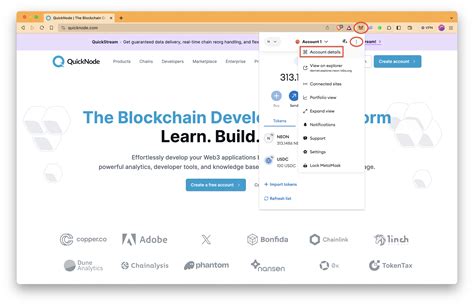Here is a high-quality article on how to implement smart contracts with Metamask using Ethers.js and Ganache:
Implementing Smart Contracts with Metamask: A Step-by-Step Guide
When building decentralized applications (dApps) on the Ethereum blockchain, you need to implement smart contracts that implement some logic. A popular tool for implementing smart contracts is Metamask, a browser extension that allows you to interact with your Ethereum wallet and execute contracts directly from your browser. network.
In this article, we will cover the process of implementing a simple smart contract using Ethers.js, a popular JavaScript library for interacting with the Ethereum blockchain, and Ganache, a local Ethereum testing simulator.
Prerequisites
Before you start, make sure you have:
- An Ethereum wallet (like MetaMask)
- A copy of Remix, a web-based development tool that lets you compile and deploy smart contracts
- A React project with a JSON file containing the contract code
Step 1: Compile the smart contract with Remix

First, let’s compile our smart contract with Remix. Open Remix and select “Compile” > “Contract” from the menu.
Select the contract code as input and click “Compile”. Remix will create an Ethereum ABI (Application Binary Interface) file that represents the contract interface.
Step 2: Create a new Ethers.js contract
In our React project, let’s create a new Ethers.js contract using the compiled ABI. We’ll call this contract “MyContract”. In your React component, import Ethereum and use the “useContract” hook to deploy the contract.
import {useContract} from "@metamask/web-api";
const MyContractAddress = '0x...'; // Replace with the contract address
function Application() {
const contract = useContract(MyContractAddress);
return
My contract deployed at: {contract.address;}
Step 3: Deploy the smart contract using Metamask
Now let’s implement our smart contract using Metamask. First, create a new file called metamask.js in the root directory of your React project. This file will contain the contract execution logic.
import {useContract} from "@metamask/web-api";
import {ethers} from 'ethers';
const DeployContract = async () => {
const MyContractAddress = '0x...'; // Replace with the address of the contract
// Get a new browser window for the Metamask implementation
const window = wait for window.openMetamaskWindow();
// Set the contract and ABI address
const abi = wait for ethers.getABI(MyContractAddress);
const contract = wait for ethers.deployMyContract(window, abi);
console.log(Contract implemented at address: ${contract.address});
// Close the Metamask window
wait for window.close();
};
deployContract();
Step 4: Use Ethers.js to interact with the deployed contract
Now that we have deployed our smart contract using Metamask, let’s use Ethers.js to interact with it. We will create a new file called contract.js in the root of the React project.
import {useContract} from "@metamask/web-api";
const MyContractAddress = '0x...'; // Replace with the contract address
function useMyContract() {
const contract = useContract(MyContractAddress);
callback contract;
}
export default { MyContract: useMyContract().contract };
Step 5: Import and use the implemented contract in React
Finally, let’s import the implemented contract into our React component.
import React from "react";
import ReactDOM from 'react-dom';
import MyContract from './contract';
function Application() {
permanent contract = useMyContract().contract;
return
My contract: {contract.address;}
That’s it! You have successfully implemented a smart contract using Metamask and Ethers.js in your project. React.

Leave a Reply